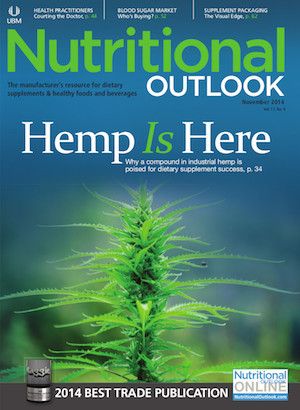Prop 65 California Regulators Consider Changing Warning Language
The American Herbal Products Association says its suggestions to make warning statements less broad-based and more specific to certain populations was well-received.
California regulators may be reconsidering the way that Proposition 65 warning statements are worded. Industry group the American Herbal Products Association (AHPA; Silver Spring, MD) reports that following a September 25 meeting with the California Office of Environmental Health Hazard Assessment (OEHHA), which oversees Prop 65, OEHHA officials showed interest in AHPA proposals to make warning statements less broad-based and more specific to certain populations.
OEHHA currently requires companies that sell products in California to use a warning statement if products may contain chemicals “known to the State of California to cause birth defects or other reproductive harm.” Companies must use this warning statement even if their products contain miniscule and arguably harmless levels of the more than 850 Prop 65–listed chemicals.
Prop 65 warnings have become so ubiquitous that many argue consumers are now tuning out those warnings. For one, because the threshold for Prop 65 chemical levels is so low, many companies choose to use the warning label preemptively, regardless of whether their products’ chemicals are actually above the threshold. Some also say that warnings don’t provide meaningful information to the consumer because the warning language is vague. AHPA calls the current wording “inflammatory” and “alarming.”
AHPA, which has been very active in Prop 65 discussions, is advocating that Prop 65 warnings instead be used to warn specific populations who may truly be at risk of harm, such as children and pregnant or nursing women. AHPA proposed these “more informative” warnings to OEHHA: “WARNING: Not for use by pregnant or nursing women,” or “WARNING: Not for use by children, pregnant or nursing women, or men or women who are trying to conceive.”
“The AHPA proposal would make warnings for exposures to Proposition 65–listed reproductive toxicants easier to understand for consumers because they instruct that the product should not be used by those populations who could be affected by exposure,” said AHPA president Michael McGuffin in a press release. “The AHPA language would fully conform to and satisfy the intent of Proposition 65 by ensuring that consumers receive ‘clear and reasonable warning’ relevant to exposures to these substances and would dramatically increase label compliance.”
AHPA, which calls its meeting with OEHHA a “breakthrough,” says OEHHA officials asked AHPA to present specific recommendations on how to include these labeling revisions within the Prop 65 regulations. AHPA and its legal counsel are now working on drafting those recommendations.
“AHPA is encouraged that OEHHA staff is receptive to amending the regulations to provide this additional warning option,” McGuffin said. “If the regulations are amended, it would be a win for consumers and companies selling food and personal care items in California.”
OEHHA has come under criticism from many industries this year when it announced this April that it plans to overhaul the Prop 65 system. In pre-regulatory proposals, the office suggested requiring companies to list specific Prop 65 chemicals that a product contains. It also proposed creating a website that would provide consumers with additional information on chemical contents. Finally, it would ban companies from using Prop 65 warnings as a “safe harbor,” only allowing products containing chemicals above the Prop 65 threshold to use the warning statement.
Read AHPA’s comments submitted to OEHHA in June following OEHHA’s pre-regulatory proposal to change Prop 65 warnings.
Jennifer Grebow
Editor-in-Chief
Nutritional Outlook magazine jennifer.grebow@ubm.com
Photo © iStockphoto.com/BanksPhotos

FDA revokes authorization to use Red No. 3 as a color additive in food or drugs
January 15th 2025FDA contends that the color additive is safe for humans but is legally obligated by the Delaney Clause of the FD&C act to revoke authorization as research shows the Red No. 3 induces cancer in rats.
Magnesium L-threonate, Magtein, earns novel food authorization in the European Union
December 19th 2024According to the announcement, the authorization is also exclusive to AIDP and its partner company and licensee, ThreoTech, meaning that they are the only parties that can market magnesium L-threonate in the EU for a period of five years.